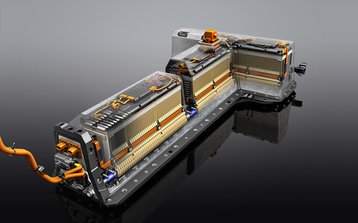General Motors is using batteries from electric vehicles to keep a facility in Milford running. This is an interesting sign, and I expect we’ll see a lot more of it.
The GM operation is pretty small scale, though the lithium-ion batteries involved are pretty chunky. The site uses five batteries from Chevrolet Volt autos, with a total capacity of 85.5kWh. That’s not much in terms of any sizeable data center, and some reports suggest that GM is only powering an office building this way.
Smoothing the power
But this sounds pretty scalable, if you have a good source of batteries - and they are not intended to power a building for any length of time. Local storage smooths out wrinkles in the grid, and increases your options in what power input you use.
Milford has solar and wind power in the form of a 74kW PV array, and two 2kW turbines. They provide power, but in peaks according to daylight and the weather. The batteries let GM store the excess and use it later, so this little outfit can be independent and have a “net-zero energy use”.
It’s possible to have local generation and sell the excess to the local utility, or simply pay to have more renewable energy put into the grid by renewable projects, as Apple, Google and Amazon are doing through power purchase agreements. In fact, these are great things to be doing.
But local generation and local storage is potentially more efficient, as it gets away from the losses in transmission that come when your spare energy gets transported away to nearby cities.
Battery technology has been the missing element in much of this, but there have been rapid changes lately, and the development of electric vehicles is creating a market which means costs will go down.
Also, the batteries used in vehicles can be the “deep cycle” type which are needed in heavy duty applications.
GM isn’t the only one to be looking at this. Tesla is offering PowerWall batteries scaled to power homes and businesses, with a similar use case of smoothing the input of renewable sources such as solar panels. Amazon Web Services (AWS) is testing 4.8MWh of Tesla battery capacity at its Northern California data. But these aren’t recycled from Tesla vehicles. The “recycled battery” idea is also being tried in Europe, though. Last year, car maker Nissan, power firm Eaton and other companies launched a project called GreenDataNet which wants to use batteries from the Nissan Leaf, to back up data centers at companies including Credit Suisse.
I contacted GreenDataNet as I haven’t heard from it since its launch a year ago. Is it going in the same direction as GM?
We should find out soon. I’ve been told the group will be sharing some more news “in the next few weeks.” Watch this space.
A version of this article appeared on Green Data Center News.



